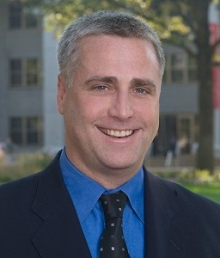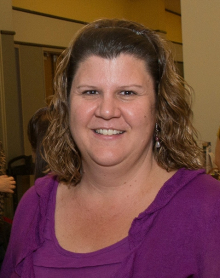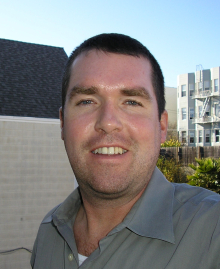Edward R. Maguire, Ph.D.
Project DirectorEdward R. Maguire is Professor and Chair in the Department of Justice, Law and Society at American University in Washington, DC. He received his Ph.D. in Criminal Justice from the State University of New York at Albany in 1997. In addition to the Trinidad and Tobago project, he recently finished a four-year study of human trafficking in the Philippines. His current research examines ballistic evidence processing in American police departments and gang violence in the Caribbean. Professor Maguire has written or edited three books and more than fifty articles and book chapters on a variety of topics, including police organization and innovation, homicide, gang violence, and juvenile delinquency. Professor Maguire served as principal investigator and director of the Trinidad and Tobago project.
Megan Gantley
Project ManagerMegan Gantley earned her Master's Degree in Conflict Analysis and Resolution from George Mason University in 2007. She most recently served as Director of Operations at Crime and Justice Analysts, Inc., a criminal justice consulting firm located in Fairfax, VA. From 2007 to 2008, she served as a Research Assistant Professor at George Mason University. Megan served as the Project Manager on the Trinidad and Tobago project.
Devon Johnson, Ph.D.
Project AssociateDevon Johnson is Associate Professor and Graduate Director in the Department of Criminology, Law and Society at George Mason University in Fairfax, Virginia. Her main research interests center around the sociopolitical aspects of the U.S. criminal justice system. Her current projects focus on public perceptions of crime and the criminal justice system, police-citizen relations, punitive crime policies, and public opinion toward domestic counter-terrorism policies and practices. Professor Johnson has received awards for her research from the American Association for Public Opinion Research and the Law and Society Division of the Society for the Study of Social Problems and she is a recipient of the Teaching Excellence Award at Mason. Prior to her appointment at Mason, she was a research associate at the W.E.B. Du Bois Institute for African and African American Research at Harvard University and a research fellow at the Center for the Study of Urban Poverty at UCLA. Professor Johnson served as the Trinidad and Tobago project team's expert on survey research methods.
Charles Katz, Ph.D.
Project AssociateCharles M. Katz is Watts Family Director of the Center for Violence Prevention and Community Safety and Professor in the School of Criminology and Criminal Justice at Arizona State University. Over the last seven years, his work has focused primarily on gangs and the response to gangs in the United States, the Caribbean, and Central America. He is currently working on a project funded by the U.S. Department of Homeland Security examining the connection between MS13 in El Salvador and the United States, and is a partner in the National Center for Border Security and Immigration (BORDERS) funded by the U.S. Department of Homeland Security. He is the co-author of Policing Gangs in America (Cambridge University Press), which received the 2008 Outstanding Book Award from the Academy of Criminal Justice Sciences. Professor Katz served as the Trinidad and Tobago Project's primary expert on gangs.
William R. King, Ph.D.
Project AssociateWilliam (Bill) King is Associate Professor in the College of Criminal Justice at Sam Houston State University in Huntsville, Texas. He earned his Ph.D. in Criminal Justice from the University of Cincinnati in 1998. Professor King previously taught and served as the Director of the Crime and Justice Research Laboratory as well as the Graduate Coordinator for the M.S. Criminal Justice program at Bowling Green State University. He is currently serving as principal investigator on a project that examines ballistic imaging practices in American police agencies and crime laboratories. Professor King served as the Trinidad and Tobago project team's primary expert on forensic science and criminal investigations.
Joseph B. Kuhns, Ph.D.
Project AssociateJoseph B. Kuhns is Associate Professor in the Department of Criminal Justice and Criminology at the University of North Carolina at Charlotte. Previously, he served as a Senior Policy Analyst at the U.S. Department of Justice's Office of Community Oriented Policing Services. Professor Kuhns has worked on dozens of research and evaluation projects focusing on spouse abuse and homicide, reducing harms associated with prostitution, community policing in small cities/towns, managing the growth of police agencies, and the relationships between drugs and violent crime. He recently co-edited a book entitled Police Use of Force: A Global Perspective. He continues to carry out research on drugs and violent behavior, relying in particular on the analysis of toxicology data from homicide victims. Professor Kuhns served as the Trinidad and Tobago project team's primary expert on illicit drugs, as well as providing expertise on community policing practices.
Jeffrey B. Snipes, Ph.D.
Project AssociateJeffrey B. Snipes is Associate Professor and Chair in the Department of Criminal Justice Studies at San Francisco State University. His major research interests have focused on the causes of crime and the nature of police behavior. As both a criminologist and an attorney, Jeff is also interested in how the Bill of Rights and civil rights statutes evolve and are applied in modern law enforcement issues such as racial profiling. Jeff is coauthor of the classic text, Vold's Theoretical Criminology, and is currently writing a book that seeks to shed light on a homicide that occurred in Los Angeles in the 1980s. As part of the Trinidad and Tobago project, Jeff relocated there for six months, where he developed significant expertise in the nation's criminal justice and census data systems.
Cassia Spohn, Ph.D.
Project AssociateCassia Spohn is a Professor in the School of Criminology and Criminal Justice at Arizona State University. She received her Ph.D. in political science from the University of Nebraska-Lincoln in 1978. Previously she was the Kayser Professor of Criminal Justice at the University of Nebraska at Omaha, where she served as director of graduate studies for 12 years and as department chair for one year. Spohn is the author of How Do Judges Decide? The Search for Fairness and Justice in Punishment, and the co-author of two other books. She has published more than 75 articles on topics such as the effects of race/ethnicity and gender on sentencing decisions, sentencing of drug offenders, prosecutors' charging decisions in sexual assault cases, and the deterrent effect of imprisonment. She is currently working on an evaluation of the serious and violent offender re-entry program of the Nebraska Department of Correctional Services. Professor Spohn served as the Trinidad and Tobago project team's primary expert on courts and sentencing.
William H. Wells, Ph.D.
Project AssociateBill Wells is Director of Research at the Bill Blackwood Law Enforcement Management Institute of Texas and Associate Professor in the College of Criminal Justice at Sam Houston State University in Huntsville, Texas. He earned his Ph.D. in Criminal Justice from the University of Nebraska at Omaha in 1999. Professor Wells previously taught in the Center for the Study of Crime, Delinquency, and Corrections at Southern Illinois University Carbondale, where he also served as Interim Director and Graduate Program Director. He is currently working on two National Institute of Justice-funded research projects: one examines the use of ballistic evidence for investigating gun crime and the other examines the issue of unanalyzed sexual assault kits in the Houston Police Department. Bill served as the Trinidad and Tobago project team's primary expert on firearms and violence.









